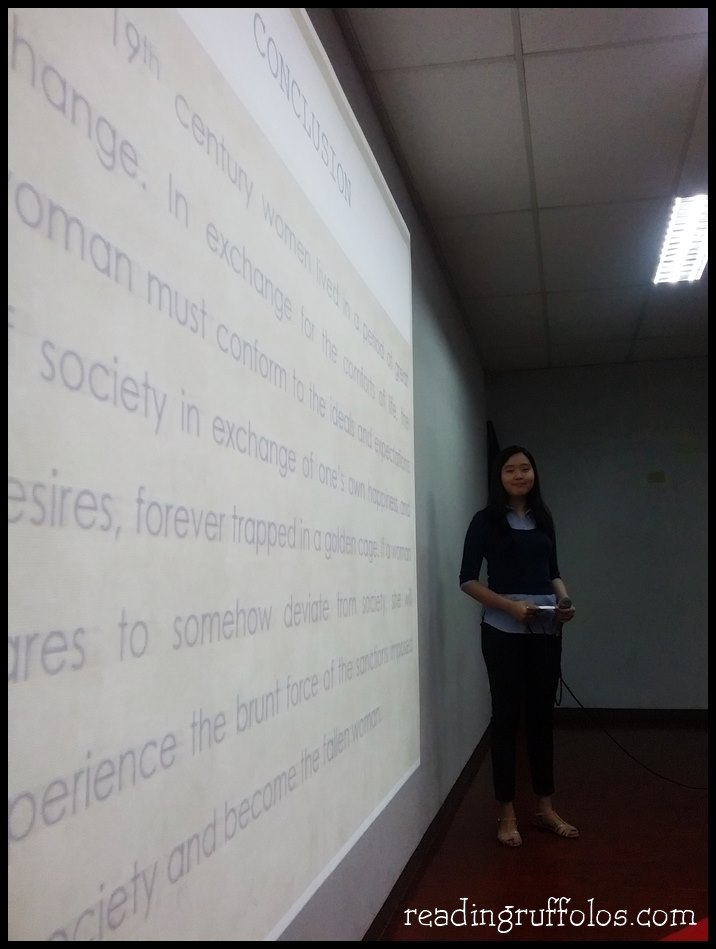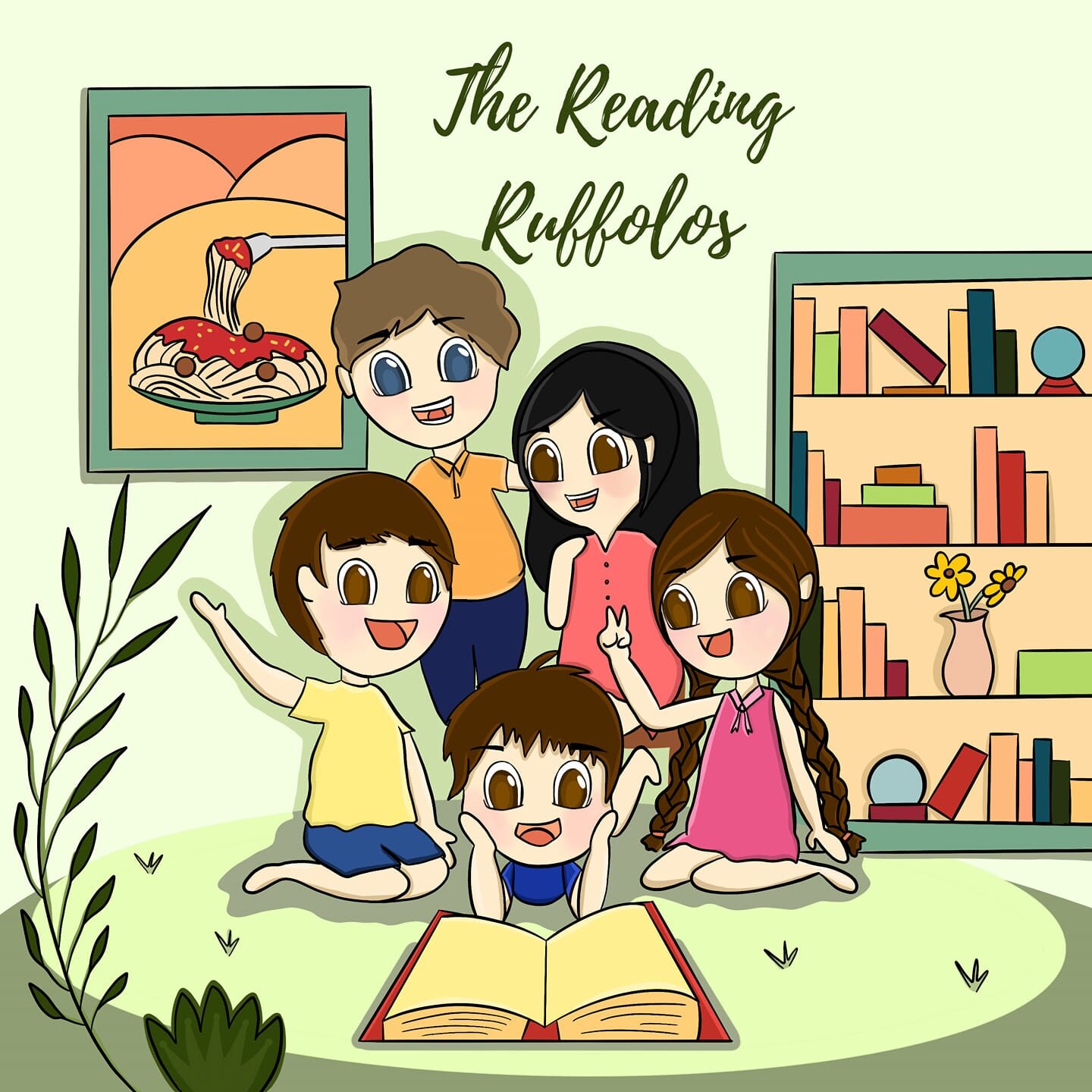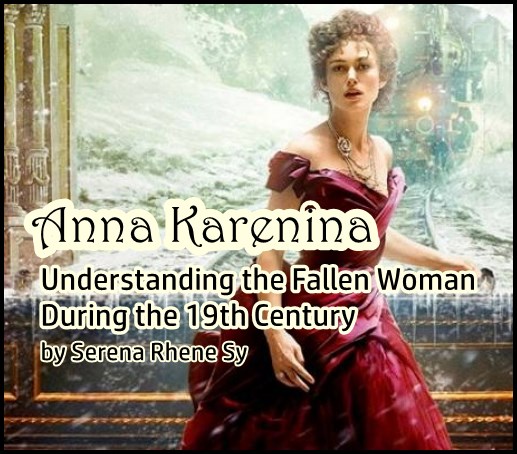I encountered the author, Serena Rhene Sy, during the Literary Criticism Workshop at the Philippine Christian Gospel School. Her teacher, Bea Martinez, is a good friend and invited me to be one of the panelists. It was a productive, albeit headache-inducing, afternoon because the 12 paper presenters were intelligent and clearly, studied their subjects well. I will be sharing more of these reviews in the succeeding Wednesdays. For now, here is Serena’s review of Anna Karenina. Yes, a 16-year-old young lady wrote this.
“Whatever happens, I know this: You’ll always be right.”
–Anna Karenina
Brought to life during a period when the Germans, Americans, and Japanese were emerging as rising powers, with Russia just beginning its rise to power, Anna Karenina brings the reader to the period of the golden age of Russia, during a time when social and political changes gave rise to the intelligentsia and the liberation of the serfs, a time when Russia faced the brutalities of the Crimean and Napoleonic Wars, a time of the diffusion and rise of the Western influence in the spheres of society, which would one day culminate in the Russian Revolution during the 20th century.
With Russian history coming into play, it is only reasonable that we take into account the author’s life and background during this time and how his experiences and the period of writing have shaped Anna Karenina. The concept of the fallen woman during this time could be said to have been a result of the heavy-handedness of society. With the double standards often seen in a patriarchal society, it is more likely that a woman’s status and reputation would fall into peril and eventual destruction rather than that of a man.
Leo Tolstoy in His Time
Tolstoy was orphaned before the infantile age of ten, giving him an acute awareness and understanding on the power of death, which is seen in his works. After he wed, he dedicated his next two decades to raising his family, managing his estate, and writing War and Peace and Anna Karenina. It has been said that his stories are often and usually modeled after his own life and this can be seen in Levin’s courtship of Kitty, down to certain details such as the forgotten shirt that had delayed Levin’s wedding. Prior to his marriage, he had spent some years with peasants in Western Europe, resulting in him being critical at the superficiality of the upper-class nobility, which can be seen in Levin’s discomfort with high society. Leo Tolstoy, a great observer and thinker of that period, would instill his political ideals and beliefs in his literary works, which not only proves to be effective in portraying his political thoughts to others, but a profound way to look at history, at the plight of the fallen woman during the nineteenth century.
Leo Tolstoy and the Fallen Woman
The idea of writing Anna Karenina came to him a day after his neighbor’s mistress, Anna Stepanovna Pirogova, crazed with grief, threw herself under a freight train at the Yasenki station. She left behind a letter, addressed to her lover, blaming him for being the cause to her succumbing to the finality of death, as a means to escape the confines of grief of being the derelict woman, the other woman—the woman who had been loved deeply, only to be left desolate in the final hours of her life. He came as a spectator when she was brought to the police station, and he tried to imagine and breathe life to the woman who had given everything for love, only to meet such an untimely demise.
In Tolstoy’s own life, he experiences the fulfilled life of parenthood and the joys of having a large family. With the time he spent at his home writing his literary masterpieces and travelling to the countryside for a time, he had developed a sense of foresight and belief that Western thought and technology that has invaded Russia was detrimental, and even evil and instead champions the belief that it is tradition and Russian beliefs that was the way to a fulfilled life, which could be shown in how Levin, and Leo Tolstoy himself, is averse to technological advancements and tries to avoid cities such as Moscow and St. Petersburg, where Western improvements are often centered in. Instead, Leo Tolstoy portrayed nature and the simplicity of rural living to be the springs of true happiness and life. It could be said, as he is a man of tradition and Russian beliefs that he greatly values the Russian way, which would explain how Anna’s path and eventual road to destruction is steeply intertwined and shadowed by the backdrop of urban cities infused with Western technology.
The Fallen Woman in Relation to ‘Progress’
While Tolstoy was writing, Russia was experiencing an influx of Western thought and progress. One of the themes of Anna Karenina is the appearance of said ‘progress’. Since ‘progress’ was seen to him as a malevolent object, it is expected that such views would be found in his work. This is best seen during the expository of the film when a man was run-over by a train, a symbol of evil and death, foreshadowing the tragedies that are to come. ‘Progress’ was often seen to be interconnected with the fallen woman, or at least, to Tolstoy. In many instances Levin was always portrayed to be wary of the cities, to avoid them as much as he can, while Anna, on her way to being a fallen woman, feels more at ease and comfortable in cities of technological advancements, cities where Tolstoy feels to be the center of the destruction of traditional Russian values, and the source of evil in Russian society.
The Fallen Woman: The Invisible Hand of Society
It could be said that the family institution was more of a cage then a home during the 19th century, especially for women. Based on the demeanor of Anna’s husband and of society portrayed in the novel, the importance of public opinion, reputation, and the inevitability of the marriage are of greatest importance. It at first could be said that the aristocrats may have characteristics of hypocrisy since many of them also are having their own affairs. But unfortunately, there is the matter of how they went about it that is different from how Anna and Vronsky handled their affair. While much nobility have engaged in extramarital affairs, they often kept the matter subtle, always committing their private affairs and other dalliances in secret, far from the public eye, not glaring as Vronsky’s and Anna’s affair had been. Vronsky’s own mother has stated that she didn’t mind their affair, having had one in her youth. She even encouraged it, as long as they go about it more casually. Unfortunately, on the basis of love both had chosen to go off and elope, catalyzing a chain of events that would ultimately culminate in Anna’s demise.
The Fallen Woman: The Double Standards of Society
There is also of course the account of double standards between men and women. During the beginning of Anna Karenina, Stiva, Anna’s brother, was seen to be flirting shamelessly with another woman, of which no one found to be out of the ordinary. The woman responded to him gaily, unperturbed with knowing the fact that he was a married man. It was ignored by all, as if it was nothing remarkable to notice, and rather commonplace. He was even pardoned immediately by his wife, when she had found that her suspicions rang true, that he had been less than faithful to her. Interestingly, Anna had played a part, lending assistance in convincing Dolly, Stiva’s wife, to forgive him. But when Anna so much was to be seen with Vronsky, rumors flare up and throughout the novel Anna was shunned, mocked, and spoken with disgust behind her back, even when Vronsky was accepted and returned to society.
The Fallen Woman: The Irrefutable Bond of the Marriage Tie
Divorce was a rare occurrence in Russia. The Orthodox Church would only permit a divorce only if it is under certain grounds and it required a strict show of evidence. Since it is often the existence of an affair that forms the ground for the dissociation of the marriage bond, the very nature of the affair—the clandestine relationship and concealment of any trace of evidence, often leaves little evidence, if any, for the jury to implicate the claim of infidelity. The process is often long and tedious that often only the rich could afford it, and even then the inquiry and investigation of the Church would have lasted a while. Had Karenin been permissive and granted Anna the divorce, it is possible that the Church still would not have granted it. Or may have, but only after a long time.
The trappings of the family institution could even be seen in Anna’s name. Karenina literally means “of Karenin”, insinuating an unceasing connection to Karenin. It could be noted how in the early stages of the plot Anna Karenina was affectionately and fondly referred to as Anna, and only after fraternizing with Vronsky wasshe referred to in her full name, a subtle reminder of her tie with Karenin and the hopelessness and inevitability of her situation.
The Powerlessness of the Circumstance and Determination to Change Them
There must be a consideration on the fact that there is inevitability to Anna’s circumstances. The laws that were supposed to be unbiased gave leeway to men. Adultery is a crime in and of itself but Vronsky was able to get away with it while Anna incessantly received the brunt of insults by the people who once were her friends. The option for divorce back then was only handled by the Orthodox Church and very rarely do they sanction it. All of this serves as a hindrance to Anna’s supposed happy ending. Circumstances itself was against her, making it difficult, if not impossible to beat the odds.
A fact to consider is that adultery is considered wrong and evil but Tolstoy paints Anna in an almost sympathetic plight. Her wrongdoings that have ill-fated everyone around her wasn’t done out of spite or malice. Rather, it was done because she seemingly had not realized or underestimated just how awful the consequences of her actions can be. And with that said, it is a tragedy ruled by fate. It could have been possible that the happy couple of Levin and Kitty could have not been together had Anna not met and captured Vronsky’s heart. In a sense, Anna had paved the way for Kitty and Levin’s marriage which is ironic considering, she was the supposed wiser of the two—wiser than Kitty, for she had the wisdom and experience in the Russian upper class. She was already prepared for success, having married a stable, influential man, and bound for a contented life of motherhood and yet, with the actions she chose, she not only managed to indirectly give Levin and Kitty a life of success, but also doomed her own.
Conclusion
19th century women lived in a period of great change. From social reforms to economical, the Russian landscape was slowly changing to suit the challenges and pressures given by more advanced neighbors. But during this time, social status was still a prerequisite for a proper lady and reputation was a must for one to live a comfortable life. Unfortunately, in exchange for the comforts of life, the woman must conform to the ideals and expectations of society in exchange of one’s own happiness and desires, forever trapped in a golden cage.
It is likely that the reason why the love story between Anna and Vronsky ended in such a tragedy is because Anna held so much meaning in love, and it meant a great amount to her that she left her old life behind. In this tale, love wasn’t the elixir to everlasting happiness, nor was it the solution to the problems or at least, not in Anna’s case. Of course, this runs against the mythology of love, which sees star-crossed lovers as the relationship one would want because they are supposedly so in love, more than the common people. If star-crossed lovers were the theme in mind, Anna’s death would have been seen as a noble sacrifice in the name of love, a shout into the void proclaiming: yes, love is worth dying for, but that isn’t the case. In Tolstoy’s narrative, love can be a curse just as it can be a blessing. Sometimes, that love can be portrayed as something one would want: good and lasting, but sometimes, it is destructive and all-consuming, an obsession fueled by lust and want, and is wrapped prettily with a bow and labeled as love. It is wonderful that Kitty and Levin found happiness in each other but, Anna would have far benefited and could have been better off if she had not met and fallen in love with Vronsky. But such is the extreme consequences of love. Anna had the choice to stay within her golden cage—trapped, forlorn, but alive, but instead she chose to wear her wings and fly, only to fall short of happiness. It is unfortunate, but even through time society has always had a heavy hand. And throughout time this had always remained true: However one would live is a curse and a blessing in and of itself.





